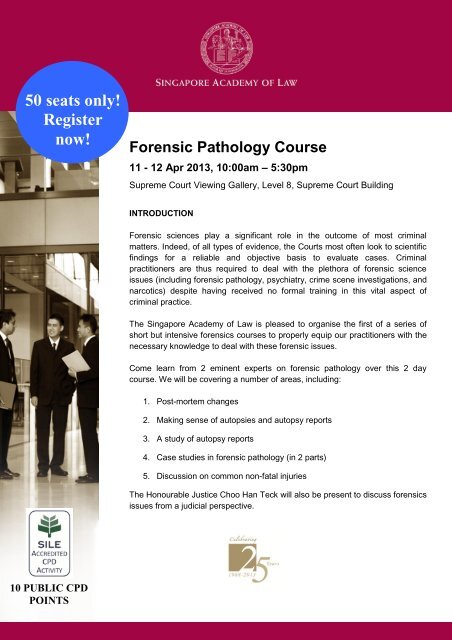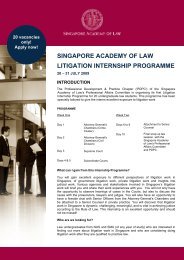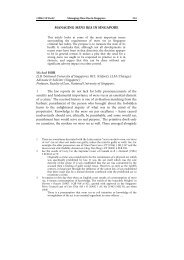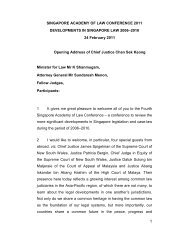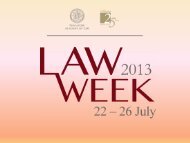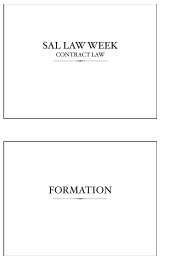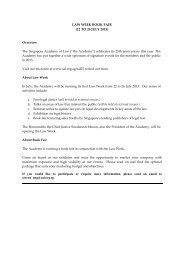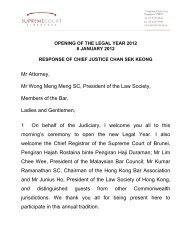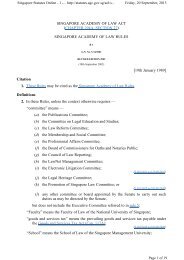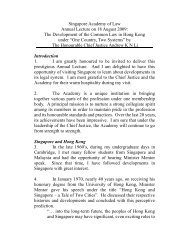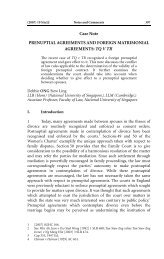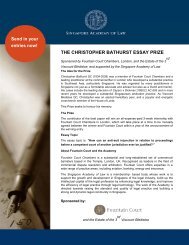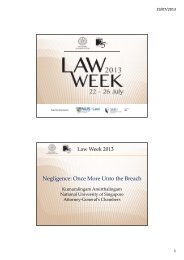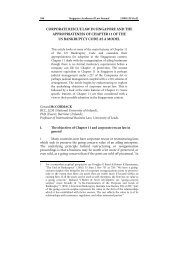Forensics Pathology Course - Singapore Academy of Law
Forensics Pathology Course - Singapore Academy of Law
Forensics Pathology Course - Singapore Academy of Law
You also want an ePaper? Increase the reach of your titles
YUMPU automatically turns print PDFs into web optimized ePapers that Google loves.
50 seats only!<br />
Register<br />
now!<br />
10 PUBLIC CPD<br />
POINTS<br />
Forensic <strong>Pathology</strong> <strong>Course</strong><br />
11 - 12 Apr 2013, 10:00am – 5:30pm<br />
Supreme Court Viewing Gallery, Level 8, Supreme Court Building<br />
INTRODUCTION<br />
Forensic sciences play a significant role in the outcome <strong>of</strong> most criminal<br />
matters. Indeed, <strong>of</strong> all types <strong>of</strong> evidence, the Courts most <strong>of</strong>ten look to scientific<br />
findings for a reliable and objective basis to evaluate cases. Criminal<br />
practitioners are thus required to deal with the plethora <strong>of</strong> forensic science<br />
issues (including forensic pathology, psychiatry, crime scene investigations, and<br />
narcotics) despite having received no formal training in this vital aspect <strong>of</strong><br />
criminal practice.<br />
The <strong>Singapore</strong> <strong>Academy</strong> <strong>of</strong> <strong>Law</strong> is pleased to organise the first <strong>of</strong> a series <strong>of</strong><br />
short but intensive forensics courses to properly equip our practitioners with the<br />
necessary knowledge to deal with these forensic issues.<br />
Come learn from 2 eminent experts on forensic pathology over this 2 day<br />
course. We will be covering a number <strong>of</strong> areas, including:<br />
1. Post-mortem changes<br />
2. Making sense <strong>of</strong> autopsies and autopsy reports<br />
3. A study <strong>of</strong> autopsy reports<br />
4. Case studies in forensic pathology (in 2 parts)<br />
5. Discussion on common non-fatal injuries<br />
The Honourable Justice Choo Han Teck will also be present to discuss forensics<br />
issues from a judicial perspective.
SPEAKERS<br />
COURSE FEES<br />
Dr. Khunying Porntip Rojanasunan is the Director-General <strong>of</strong> Thailand’s Central<br />
Institute <strong>of</strong> Forensic Science, an independent laboratory under the Ministry <strong>of</strong><br />
Justice. She was conferred the honorific title <strong>of</strong> Khunying by the King <strong>of</strong> Thailand<br />
in 2003 and has also received many awards for her contributions to Thai society<br />
including the Royal Order <strong>of</strong> the North Star (Sweden) and the Knight Grand<br />
Cordon (First Class <strong>of</strong> the Most Noble order <strong>of</strong> the Crown <strong>of</strong> Thailand). She has<br />
also been named an outstanding defender <strong>of</strong> human rights.<br />
Gilbert Lau is a Fellow <strong>of</strong> the Royal College <strong>of</strong> Pathologists and a Clinical<br />
Associate Pr<strong>of</strong>essor with the Yong Loo Lin School <strong>of</strong> Medicine, National University<br />
<strong>of</strong> <strong>Singapore</strong>. He is a practising senior consultant forensic pathologist and<br />
concurrently Director <strong>of</strong> Pr<strong>of</strong>essional Practice at the Forensic Medicine Division,<br />
Health Sciences Authority, <strong>Singapore</strong>. A member <strong>of</strong> the editorial boards <strong>of</strong> the<br />
Forensic Science International and Forensic Science, Medicine and <strong>Pathology</strong>, he<br />
also reviews papers for the Journal <strong>of</strong> Forensic and Legal Medicine, Journal <strong>of</strong><br />
Clinical <strong>Pathology</strong>, Annals <strong>of</strong> the <strong>Academy</strong> <strong>of</strong> Medicine, <strong>Singapore</strong>, and the<br />
<strong>Singapore</strong> Medical Journal. His academic interests and publications include<br />
iatrogenic deaths, pulmonary thromboembolism, maternal deaths and fatal falls<br />
from heights.<br />
To recognise the contribution <strong>of</strong> Pro Bono <strong>Law</strong>yers, the first 30 Defence Counsel who are active in the<br />
CLAS or LASCO scheme (as identified by the CLAS / LASCO Committee) to register will enjoy a subsidized<br />
rate <strong>of</strong> $267.50 (inclusive <strong>of</strong> GST). All other registrants will pay a rate <strong>of</strong> $353.10 (inclusive <strong>of</strong> GST).<br />
REGISTRATION<br />
Please email the completed form to pa@sal.org.sg. Confirmation <strong>of</strong> registration and payment details will be<br />
emailed to successful participants within 5 working days. Registration closes at 5:00 pm on 28 March 2013<br />
or once seats are filled. For enquiries, please contact pa@sal.org.sg or 6332 0019 / 6557 7523.<br />
Company: __________________________ Participant: Mr / Ms / Mrs / Dr: __________________________<br />
Contact Person: __________________________ Participant Designation: __________________________<br />
Telephone: __________________________ Participant Telephone: __________________________<br />
Email: __________________________ Participant Email: __________________________<br />
Bill to Individual Bill to Firm SAL No. (e.g.:A0012): __________________________<br />
Registered with CLAS scheme Registered with LASCO scheme<br />
10 PUBLIC CPD Points. Practice Area: Pr<strong>of</strong>essional Skills.<br />
Training Level: General.<br />
SILE Attendance Policy<br />
Participants who wish to claim CPD Points are reminded that they must comply strictly with the Attendance<br />
Policy set out in the CPD Guidelines. This includes signing-in on arrival and signing-out at the conclusion <strong>of</strong><br />
the activity in the manner required by the organiser, and not being absent from the entire activity for more than<br />
15 minutes. Participants who do not comply with the Attendance Policy will not be able to obtain CPD points<br />
for attending the activity. Please refer to http://www.sileCPDcentre.org.sg for more information.
COURSE SCHEDULE<br />
Day 1 – 11 April 2013 (Thursday)<br />
9:30am – 10:00am Registration<br />
10:00am – 10:15am Opening Remarks and Introduction <strong>of</strong> Trainers<br />
10:15am – 11:30am Post-Mortem Changes<br />
11:30am – 11:45am Tea Break<br />
The forensic significance <strong>of</strong> observable changes to the human body<br />
following upon death, as a basis for the correct interpretation <strong>of</strong> injuries<br />
found on post-mortem examination.<br />
Primary Trainer: A/P Gilbert Lau<br />
11:45am – 1:00pm Making Sense <strong>of</strong> Autopsies and Autopsy Reports<br />
1:00pm – 2:15pm Lunch<br />
Types <strong>of</strong> autopsies; the structure <strong>of</strong> an autopsy report; the causes <strong>of</strong><br />
death.<br />
Primary Trainer: A/P Gilbert Lau<br />
2.15pm – 3.30pm A Study <strong>of</strong> Specimens <strong>of</strong> Autopsy Reports<br />
3:30pm – 3:45pm Tea Break<br />
An open discussion on a series <strong>of</strong> 4 specimens <strong>of</strong> autopsy reports<br />
(completely anonymised)<br />
Primary Trainer: A/P Gilbert Lau<br />
3:45pm – 5:00pm Crime Scene Investigations<br />
Usual forensic traces found at scenes <strong>of</strong> crime (e.g. blood stain pattern<br />
analysis, impact spatter blood stains, characteristic blood patterns) and<br />
discussion on crime scenes involving falls from heights, gunshot<br />
wounds, fire, drowning, asphyxiation cases<br />
Primary Trainer: Dr. Rojanasunan
Day 2 – 12 April 2013 (Friday)<br />
10:00am – 11:30am Case Studies in Forensic <strong>Pathology</strong> - 1<br />
11:30am – 11:45am Tea Break<br />
Various types <strong>of</strong> injuries commonly encountered in forensic casework<br />
and the nature and significance (i.e. the proper interpretation) <strong>of</strong> these<br />
findings considered in a series <strong>of</strong> illustrated case studies.<br />
Primary Trainer: A/P Gilbert Lau<br />
11:45am – 1.00pm Case Studies in Forensic <strong>Pathology</strong> – 2<br />
1:00pm – 2:15pm Lunch Break<br />
Various types <strong>of</strong> injuries commonly encountered in forensic casework<br />
and the nature and significance (i.e. the proper interpretation) <strong>of</strong> these<br />
findings considered in a series <strong>of</strong> illustrated case studies.<br />
Primary Trainer: Dr. Rojanasunan<br />
2:15pm – 3:30pm Discussion on Common Non-Fatal Injuries<br />
3:30pm – 3:45pm Tea Break<br />
Fractures, bruises, abrasions, lacerations, incisions, stab wounds, head<br />
and neck injuries, self-inflicted wounds) and common secondary injuries<br />
caused or contributed to by primary injuries.<br />
Primary Trainer: Dr. Rojanasunan<br />
3:45pm – 5:00pm Judicial Perspective on Forensic Evidence<br />
Speaker: The Honourable Justice Choo Han Teck<br />
5:00pm – 5:15pm Closing Remarks and Conclusion <strong>of</strong> <strong>Course</strong>


